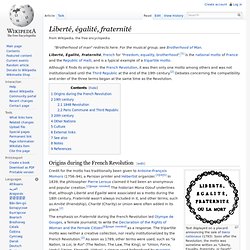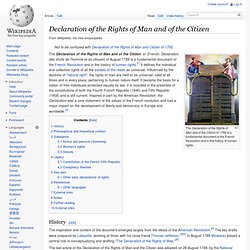

Liberté, égalité, fraternité. Although it finds its origins in the French Revolution, it was then only one motto among others and was not institutionalized until the Third Republic at the end of the 19th century.[2] Debates concerning the compatibility and order of the three terms began at the same time as the Revolution.

Origins during the French Revolution[edit] Text displayed on a placard announcing the sale of biens nationaux (1793).
The French Revolution for Dummies. French Revolution. The French Revolution (French: Révolution française) was an influential period of social and political upheaval in France that lasted from 1789 until 1799.

Inspired by liberal and radical ideas, the Revolution profoundly altered the course of modern history, triggering the global decline of theocracies and absolute monarchies while replacing them with republics and democracies. Through the Revolutionary Wars, it unleashed a wave of global conflicts that extended from the Caribbean to the Middle East. Historians widely regard the Revolution as one of the most important events in human history.[1] Declaration of the Rights of Man and of the Citizen. The Declaration of the Rights of Man and of the Citizen of 1789 is a fundamental document of the French Revolution and in the history of human rights The Declaration of the Rights of Man and of the Citizen, or (French: Déclaration des droits de l'homme et du citoyen) of August 1789 is a fundamental document of the French Revolution and in the history of human rights.[1] It defines the individual and collective rights of all the estates of the realm as universal.

Influenced by the doctrine of "natural right", the rights of man are held to be universal: valid at all times and in every place, pertaining to human nature itself. It became the basis for a nation of free individuals protected equally by law. It is included in the preamble of the constitutions of both the Fourth French Republic (1946) and Fifth Republic (1958) and is still current. Considerações.